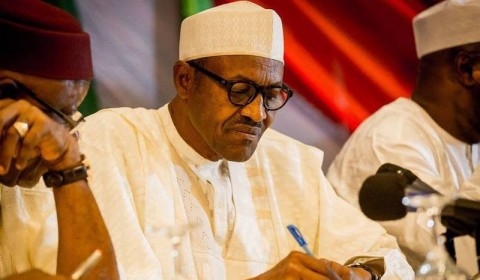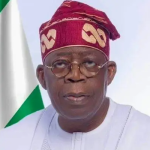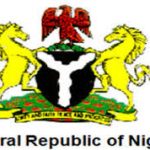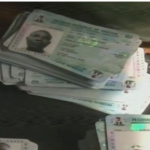OPINION: Should we Judge Buhari Now?
Articles/Opinion, Featured Contributors/Columnists, Latest Headlines Thursday, April 21st, 2016
By Olawale Rasheed
BALTIMORE, MD (AFRICAN EXAMINER) – Reading several commentaries harshly judging President Muhammadu Buhari often elicits strange introspection for me.You now find “wailing wailers” across party lines and from unusual quarters.I have been asking myself if the time is truly ripe to rate Buhari’s tenure as President of the republic.
My introspection is really very strange considering the reality today that the country is not in the best of shape. From utility services to fiscal issues,the statistics are worrisome.The turn of event is so far unpalatable to most Nigerians. Reports even indicated that a very annoying audio clip in Hausa language from Kano state has gone viral ,criticizing the president’s handling of the economy.From his northern base,the grumbling is getting louder by the day.
But I continuously have the feeling that the president and his team must have solutions waiting for manifestations. It cannot be true that the new administration has run out of steam barely a year after taken over. It is impossible to believe that the change team is overwhelmed by the enormity of inherited challenges.I may be wrong but something keeps on telling me we should tarry a while before passing a verdict.
Let me analyze the background to where we are.Political campaigns are mostly full of chronic propaganda and deceitful promises. This is so in Africa as in the settled democracies. The spin masters in the ruling and the opposition parties competed to outwit each other and outmaneuver the voting public.In the last poll ,the ruling party failed in the spinning art.The opposition machine proved more lethal.
Politicians had fought a bitter political battle ,deploying all tools to secure support of the masses.The old opposition now in power faces a bitter old ruling elite even as the new rulers have eternal fears of opposition resurgence . A stunning realization has surfaced,telling the new power wielders that there is a difference between the world of politicking and governance. The first is a game of manipulation while the second is a manifestation of reality.
The difficulties confronting the nation has been variously listed as corruption,insecurity,epileptic social services ,mono- economy ,infrastructural deficit,integrity in leadership among others. Here is the world of realities rather than fantasy. The Minister of Information,Alhaji Lai Mohammed must by now have admitted that self evident truth. After spinning the public during elections,the elected is bombarded by governance monsters,some which he is prepared for and others just surfacing.
Any excuse is sure to be rebuffed by the voters. To them,the elected saw it coming. To the defeated political elite,it is time to seek a pound of flesh.In the Nigerian setting,the ensuing altercations can be very turbulent and caustic.Nigerians are also deeply politically savvy. Their expectations cannot be moderated by alibi no matter how authentic.This is a presidential dilemma that presents a very hard nut to crack for presidential handlers.
I remember a briefing at the Federal Ministry of Power sometimes in late 2014. Professor Chinedu Nebo,the then Minister of Power was almost weeping. Yours was a Special Assistant to the Minister of State power. He lamented that anytime power generation is about to hit 5000MW or more, gas pipeline would be vandalised and Nigeria would crash to 2000 MW or less.That act of sabotage was a recurring punch in the last one decade or so.
That was the dilemma of the Jonathan presidency and it is going to be the headache of the Buhari administration for sometimes to come. The power sector is a work in progress that cannot be fixed in any magical manner. Whoever is occupying the presidency,the sad reality is that increasing generation capacity is not a day job. From generation to distribution ,the chain is not just complex but full of multiple disruptive issues either linked with decades of no investment in the sector or complications arising from the power sector reform process.
For the oil sector,I recalled a confidential briefing then about the stranglehold of special interests on the oil sector.That was the report that motivated the attempted subsidy removal of 2011/2012 and the subsequent clampdown on the subsidy cabal.This also has to do with the failure of the National Assembly to pass into law the Petroleum Industry bill. The cabal that frustrated reform in the past is still very much on ground. Punishing a government that attempted curtailing their hold on the sector is a common practice.
Hence disruption in the oil supply chain results when genuine attempt is made to block leakages. Subsidy payment is still a knotty issue and the Minister of State for Petroleum,Ibe Kachikwu is discovering that reforming the corporation is not a tea party. So far he has not achieved any major targets he sets for himself on assumption of office. Accountability issues still persist within the oil sector. At least ,a PPMC boss appointed to replace Prince Haruna Mommoh under the current dispensation is now under probe by the anti- graft agency.
Buhari presidency is facing harsh reality of developmental hiccups confronting the nation. If we remove political consideration,it is easy to see the issue in the right perspective. But how do you avoid politics in policy review with the nation’s recent past? How do you appease those who lost out not to fight the status quo? How do we stop the threatening storm of revenge politics that is taken hold of the nation?
To put the scenario in proper focus,there are of course three types of critics that have surfaced in recent weeks namely the opposition parties which have every reason to pick holes in actions and inactions of the ruling party; the poor that are feeling the pinch of national squeeze ; and some insiders within the ruling party with political interests beyond the status quo.I am less concerned with the first and the third categories. In fact I will return to them later.
The poor ,the second category ,forms the support base of the President. They were the best agents of Sai Baba during the elections. Today,they are bitter and disenchanted about the state of the nation. Their hope on the Buhari presidency was messianic;their expectation expectedly very huge. In motor parks,markets places and many slums,they are questioning the status quo.This class probably forms the majority.
This is the class the administration must urgently attend to. These are the people ,the ultimate holders of sovereignty. If the administration target and convince the people ,it may go to sleep. This is however a very tough job especially with an a hungry population.If the social palliatives component of the budget 2016 are implemented to the letter,the people may listen and the job performance of the President may improve among the citizenry.
There is a group of critics that may be hard to appease.Opposition politicians and their supporters are embarking on another round of politicking ahead of future contest. They are launching their own manipulative game,plotting to dethrone the incumbent by 2019. More rabble rousing are to be expected as the opposition simply replays the old template in the power struggle. They know the utility crisis is not the turf of a magician; they will be quick to overlook technical justifications by simply chorussing “deliver on your electoral promises.
In a seemingly vicious cycle,the ruling party may relapse to election mode,forgetting it is holding ,not seeking power. It is elementary that applying electoral spin to governance crisis has no chance of success. Insistence on such line has the consequence of further alienating the complaining masses. The masses are indeed demanding a new narrative as they compare the acidic criticisms of the opposition and the ruling parties.
The third category of critics,the insiders ,are the most dangerous and most threatening. The internal politics of the ruling party provides fertile ground for fifth columnists to operate. They bankroll attacks on the administration using outside sources. To them,rubbishing the incumbent is a great service to a 2019 agenda. More than three factions have been identified on this line of action.
But the third group are in two camps namely those who desperately want to upstage the incumbent and those who have truthful concerns about lapses in the administration which they will want to see corrected.At times,the line blurred.
Whatever the categories of critics,something appears to be amiss- most current criticisms are not strategically focussed. Budget 2016 and its implementation hold the key to rating of the president. What the administration do with a six trillion budget will provide sound basis for a review. Overlooking all previous confusions, Nigerians can judge the president better probably after implementation of his first budget.
If after spending six trillion naira,the economy is still in comatose,power is still epileptic and real sector is still sluggish,then the nation can rise in unison. In any case ,experts are saying budget implementation will grow all sectors and sub- sectors of the society,thereby easing the burden of the masses. How true that will play out is still a conjecture.
For political and partisan critics of the administration,it is the usual game in power struggle. But the main losers currently are the masses,the pawn in the chess game of the political class.
*Rasheed, Editor-Chief of Sahestandard.com,writes from Abuja.
Related Posts
Short URL: https://www.africanexaminer.com/?p=32019






















